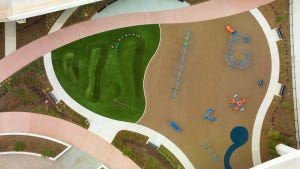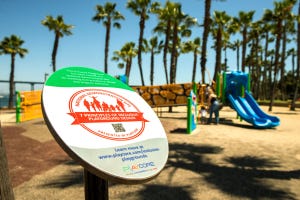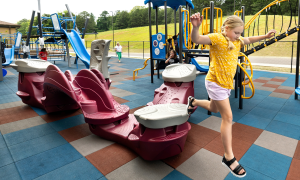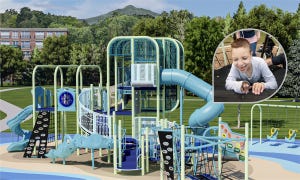Building support for a playground project may seem to be a daunting task, but it is well worth the fight. Research shows children are at their highest level of development when at play. The physical, social, emotional, and cognitive benefits of play are essential to a child’s overall wellbeing.
When you consider how the COVID-19 pandemic affected the lives of children, it’s more important than ever to advocate for outdoor play spaces. Read on and learn five ways to support the cause for play and make it part of your community.
1. Become a Play Expert
Before you start building awareness for your cause, it is important to establish yourself as the go-to play resource. Here are some facts that communicate why parks and playgrounds are important. Commit them to memory or keep them handy in case you have an opportunity to share with others:
Public parks are a vital component of our community- they conserve nature, beautify neighborhoods, and provide children with an accessible way to achieve healthy physical, social, emotional, and intellectual development.
Right now is the best time to advocate for a park. Many schools are still using a hybrid approach to learning. This has led to an unprecedented rise in mental health issues among children.
Pandemic aside, one in three children are overweight or obese by age six. This is largely due to children spending more time indoors. Parks and playgrounds are a great way to reverse this trend.
This list alone is not enough to become a play expert. It is important to read literature to learn the many and varied benefits of play. PlayCore’s Words on Play publication highlights research-based works of respected play authorities and is a great resource on how to advocate for the many critical benefits of play. You can request a free copy to use in your advocacy and grant writing efforts.
2. Build a Support Network
The next step to starting your playground is building a network of like-minded people. Reach out to organizations like the National Recreation and Parks Association (NRPA) or your local parks and recreation department to see if they have any resources or programs to help accomplish your goal. Research if any playground equipment providers are offering grants.
The more people you have on your side, the better.
3. Involve the Community
Once you establish your support network, you can take the critical step of involving the community in your playground project.
Build relationships with government officials, state legislators, and special interest groups who advocate for play and recreation. Host an educational event to share research and build awareness in the community. Invite the important people you built relationships with to attend.
GameTime can help you plan, promote, and lead your educational workshop. PlayCore’s Center for Outreach, Research, and Education (CORE) provides dozens of symposiums and community meetings across the country.
As the event draws to a close, hand out fact sheets to build top-of-mind awareness. Take an interest survey to see if your community supports the project. Emphasize you are presenting a solution for childhood health and wellbeing for generations to come.
4. Take Your Playground Project to the Web
Get your community involved through a social media campaign. Create sharable Instagram content such as infographics on the benefits to play. Engage with your supporters and build a safe space for people to share ideas and concerns.
Use social channels to publicize progress with your playground project and create trust among your followers. Create realistic goals and include action steps that your followers can take to help.
The most important factor to the success of a social media campaign is to stay active. Make your posts relevant and interesting. Remind your followers why this is a project worth supporting.
5. Mark Your Calendars for Playground Funding
The last step to raising awareness and support for your playground project is to hold fundraising events. Not only do these events help raise money for the playground, but they also build awareness in the community. If possible, schedule your events to coincide with national or local play-related campaigns to increase visibility.
Note the following important dates related to parks and play:
- July is Parks and Recreation month
- Nickelodeon’s Worldwide Day of Play is September 21, 2021
You can even create your own events. For example, the Association of Play Industries in the UK created a #SummerOfPlay to inspire children to go outdoors. GameTime worked with communities across the country to create #AcceptTheChallengeDay to support outdoor play and fitness using Challenge Course outdoor obstacle courses.
Use your established social media following to plan events and ask your followers to come out and support.
Become a Play Advocate
Building support for your playground project takes time and effort, but the end result is worth the investment. Do your research, build a support network, and reach out to the community. Use social media to your advantage and host fundraising events.
If you need help raising awareness for your park or playground project, contact the GameTime representative in your neighborhood.





